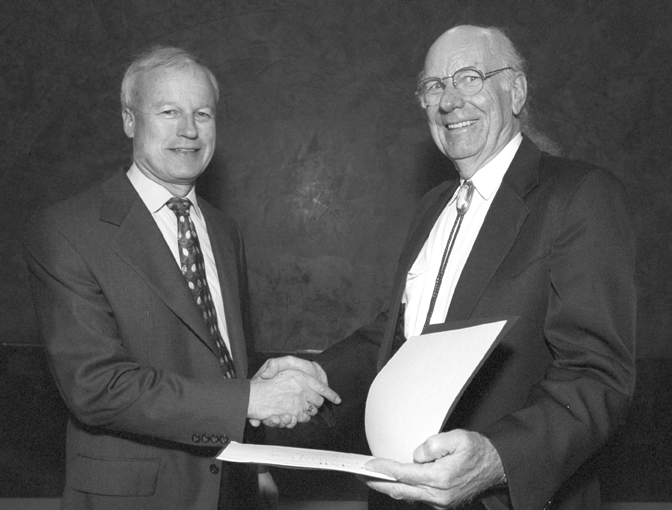
 |
| Volume 52, Number 1, Winter, 2002-03 |
 |
| Daniel
Haney (left) is congratulated by CASW President Jerry Bishop upon receiving
the Victor Cohn Award.
[Photo courtesy of Washington University In St. Louis.]
|
DANIEL HANEY WINS 2002 VICTOR COHN PRIZEby Lynne FriedmannDaniel Q. Haney, the chief medical correspondent for the Associated Press, has been awarded the 2002 Victor Cohn Prize for Excellence in Medical Science Reporting. The prize, for a body of work published or broadcast within the last five years, was created by the Council for the Advancement of Science Writing (CASW). The $3,000 award was presented to Haney on Oct. 28, 2002 at the Council’s 40th annual New Horizons in Science Briefing held at Washington University in St. Louis. The judges felt that Haney’s work has made an important contribution to American medical writing. His news and feature stories appear in newspapers around the world, and, by virtue of their breadth and depth, they play an important and often unrecognized role in shaping medical coverage by others. His clarity, accuracy, speed, and broad understanding of medical reporting have earned him the respect of his colleagues at newspapers across the country. Haney, 54, was born in Houlton, Maine. He studied journalism at Boston University. After graduating, in 1970, he joined the Associated Press in Portland, Maine. He transferred to the AP’s Boston bureau later that year and has been there ever since. “I never set out to be a medical writer,” Haney said in remarks at the awards banquet. “My career plan was to get on the AP national wire. But I was lucky because another writer came to work for the AP who knew what he wanted to do. That was Warren Leary, and he wanted to be a science writer.” Haney told the audience that Leary, a science correspondent for the New York Times, created the medical writing beat at the AP by covering “an obscure journal-The New England Journal of Medicine.” “My next lucky career break was when Warren left town,” Haney said. “My editor plopped the NEJM on my desk. I’d never read it before.” Haney wrote a story from that issue and “it flew right out on the national wire.” “The next week I was looking for the journal,” he said. Haney began covering medical news part-time in 1984. He was named medical editor of the AP in 1996, and last year he was named a special correspondent, an honorary title given to only 22 journalists in AP’s history. For the past two decades, Haney has covered virtually every major medical story in the United States and around the world. His is a familiar face in press rooms at medical meetings everywhere. The Cohn Award has special significance for Haney, who considered Victor Cohn a mentor. Haney first met Cohn in 1979, at a press conference in Boston announcing a new book by Masters and Johnson. Haney was impressed by Cohn’s ability to get to the heart of the matter. “All the other reporters were asking very show-off questions,” Haney said. “Eventually, Vic spoke up in very normal, everyday language and asked ‘what does it mean?’”
The Cohn Prize honors the late Victor Cohn, a science and medical reporter for the Minneapolis Tribune, and then science and medical reporter and health columnist for the Washington Post. Cohn distinguished himself for the clarity, honesty, robustness, fairness, and effectiveness of his reporting. He was himself the recipient of numerous writing awards during his long career. In 1959, Cohn co-founded CASW. He was a past president of NASW, and the co-author of the widely used book News & Numbers, a journalist’s guide for interpreting and reporting statistical data in medical and scientific reports. The Victor Cohn Prize is intended to honor work which, for reasons of uncommon clarity, accuracy, breadth of coverage, enterprise, originality, insight and narrative power, has made a profound and lasting contribution to public awareness and understanding of critical advances in medical science, and their impact on human health and well-being. The judges for the 2002 Victor Cohn Prize were Carol Ezzell, an editor at Scientific American; Paul Raeburn, a senior writer at Business Week; Cristine Russell, a freelance science and medical reporter and former reporter for the Washington Post; and Lois Wingerson, editorial manager, News and Comment, at BioMedNet. # Lynne Friedmann is editor of ScienceWriters. A CASW news release was used in the preparation of this story. |